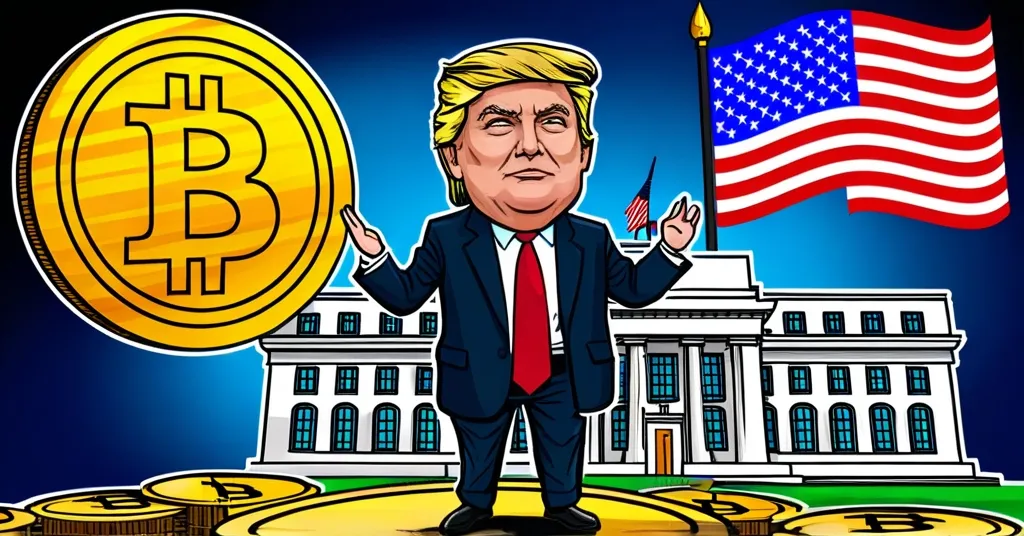Could Trump Bypass the Fed to Establish a U.S. Bitcoin Reserve?

As Bitcoin faces skepticism from the Federal Reserve, could a bold move from Donald Trump change the narrative? Federal Reserve Chairman Jerome Powell remains resolute in his stance, declaring that “The Fed is not the place for Bitcoin.” His blunt remarks sent Bitcoin’s market value plummeting by 7.5%, rattling investors and casting doubt on the cryptocurrency’s future integration into mainstream financial systems. However, former President Donald Trump might have a plan that bypasses the Fed altogether, potentially leveraging the U.S. Treasury’s Exchange Stabilization Fund (ESF) through an executive order to establish a Bitcoin Strategic Reserve.
- Federal Reserve Chairman Jerome Powell declared the Fed’s disinterest in Bitcoin.
- Bitcoin’s market value fell 7.5% following Powell’s comments.
- Trump could use an executive order to direct the Treasury’s ESF to acquire Bitcoin.
- Senator Cynthia Lummis proposed the U.S. Bitcoin Strategic Reserve Act.
- Legislation would secure Bitcoin’s strategic asset status, but faces bipartisan challenges.
The ESF, under the U.S. Treasury’s control, is a financial tool capable of operating independently from congressional budget approval, meaning Trump could potentially use it to acquire Bitcoin without needing to convince Powell or the Fed. Yet, this approach is not without its hurdles. Legal experts point out that despite the ESF’s capabilities, congressional backing may still be crucial for ensuring a legally sustainable strategy.
“Trump doesn’t need Powell or the Fed.” – On Trump’s potential executive leverage via the Treasury.
Meanwhile, Republican Senator Cynthia Lummis has taken a different path by introducing the U.S. Bitcoin Strategic Reserve Act, a legislative proposal aimed at designating Bitcoin as a strategic asset. Her plan involves the U.S. Treasury accumulating 200,000 bitcoins annually until reaching a million, a move that could provide more permanence than executive orders. However, the path through legislation is fraught with the usual pitfalls of partisan politics, where gaining bipartisan support can be a Herculean task.
Proponents of a U.S. Bitcoin reserve argue that it could strengthen the dollar and reduce national debt, presenting Bitcoin as a long-term strategic asset. Critics, however, highlight Bitcoin’s notorious volatility and lack of intrinsic value, alongside cyber vulnerabilities that could pose risks to national reserves.
Beyond domestic financial strategy, the creation of a Bitcoin reserve has significant geopolitical implications. Such a move could position the U.S. as a key player in the global Bitcoin market, counterbalancing China’s growing influence in the cryptocurrency space. Yet, the tension between financial innovation and regulatory caution, as exemplified by the Federal Reserve’s current stance, remains a significant barrier.
- Can Trump create a Bitcoin Strategic Reserve without the Fed’s approval?
Yes, Trump could potentially use an executive order to leverage the Treasury’s Exchange Stabilization Fund for acquiring Bitcoin, but legal challenges and opposition may arise. For more details, see Trump executive order Exchange Stabilization Fund. - What impact did Powell’s statement have on the crypto market?
Powell’s comments led to a 7.5% drop in the cryptocurrency market value, reflecting investor concerns over regulatory resistance. Learn more about the impact of Federal Reserve on cryptocurrency market. - What is the U.S. Bitcoin Strategic Reserve Act?
The U.S. Bitcoin Strategic Reserve Act is a legislative proposal by Senator Cynthia Lummis aiming to establish Bitcoin as a strategic asset for the U.S., with plans to accumulate a significant Bitcoin stockpile. Find further insights from the Cynthia Lummis Bitcoin Strategic Reserve Act discussion on Quora. - Why is the legislative route considered more stable than an executive order?
Legislation provides legal permanence that cannot be easily reversed by subsequent administrations, ensuring a more stable and enduring policy. - How does the Federal Reserve’s stance affect potential Bitcoin integration?
The Fed’s current stance and lack of policy framework restrict its ability to integrate Bitcoin, leaving the Treasury as the more feasible governmental option for a Bitcoin reserve.
The potential integration of Bitcoin into national reserves could reshape international economic relations and monetary policy. As discussions continue, the clash between the promise of financial innovation and the caution of regulatory frameworks highlights the complexities of adopting cryptocurrencies within government strategy. For community opinions, explore the discussion on Trump’s Bitcoin Strategic Reserve on Reddit.



